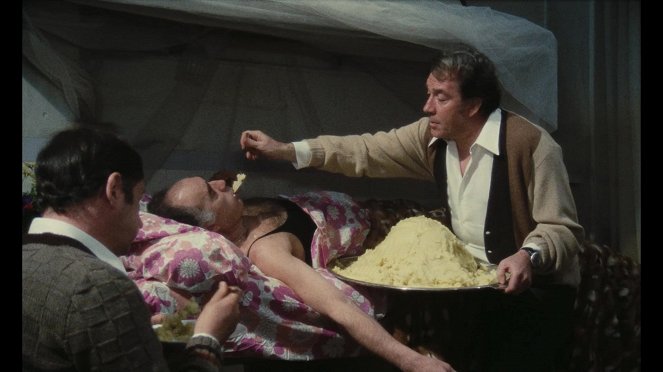Réalisation:
Marco FerreriScénario:
Marco FerreriPhotographie:
Mario VulpianiMusique:
Philippe SardeActeurs·trices:
Marcello Mastroianni, Michel Piccoli, Philippe Noiret, Ugo Tognazzi, Andréa Ferréol, Florence Giorgetti, Maurice Dorléac, Monique Chaumette (plus)Résumés(1)
Quatre amis, un cuisinier (Ugo), un réalisateur (Michel), un pilote de ligne (Marcello) et un juge (Philippe), se réunissent dans une belle demeure parisienne pour un "séminaire gastronomique". Ils décident de se gaver tout un week-end de mets finement préparés jusqu'à ce que mort s'ensuive. Ils invitent à leurs agapes trois prostituées et une institutrice (Andréa). Seule cette dernière assiste jusqu'au bout les quatre hommes dans leur entreprise suicidaire. (Arte)
(plus)Critiques (4)
Le problème de ce film est qu'il ne cherche pas à nous transmettre quoi que ce soit. La conception originale le rend inoubliable et unique en son genre, mais le traitement simpliste et la non-cristallisation de l'histoire elle-même nous laisse indifférents. J'ai été amusé et j'ai même développé de la sympathie et de la compréhension envers le personnage de Philippe Noiret. Un personnage agréable. Mais avec un casting et un potentiel de controverse aussi élevés, j'espérais plus du film.
()
In the life of most intellectuals, there comes a moment when they begin to reflect on the state of the world, and this is a very risky matter. In the overwhelming majority of cases, the conclusion is reached that the world is corrupt, full of injustice, suffering, and exploitation, and unless something drastic is done about it, it is inevitably heading towards a painful demise. If the world is lucky, it will remain with proclamations and warnings, perhaps resulting in an eco-activist essay or a film relentlessly attacking the villains of the world. Fortunately, most intellectuals belong to the realm of idle theorists, but occasionally the world is unfortunate and an intellectual goes from words to actions. Marco Ferreri, fortunately, is no Lenin and sticks to very superficial criticism of consumerism. There are topics that are popular to criticize in one's youth, while some are better criticized in one's prime years (for example, sexual promiscuity). However, there is a rare consensus against consumer society - young and old, small and large, all resist it. It always moves me how intellectuals despise me for my car, apartment, and four meals a day, and tell me of the example of a nomad somewhere in the Sahel who eats only one meal a day in poverty and is supposedly happier than me. I'm not sure if the nomad would eagerly consume if he had something to consume. It's amazing that whenever a poor society had the opportunity for economic advancement, it gladly gave up happiness and instead acquired refrigerators, cars, or motorcycles, enthusiastically imitating the lifestyle of the unhappy Western civilization. Those noble critics of consumerism miss many things - consumer society is by nature less radical, less eager for conflict, and less sick. Besides, communism was not destroyed by weapons and intrigues of Western imperialists, but by the long-term consumption of inedible products while our neighbors on the other side of the fence consumed to the extreme. Marco Ferreri attempted to make a satire of consumer society through four friends who decided to starve themselves to death. What motivates them, the director did not tell me. Was it that they could no longer handle the disgust at how the world around them consumed so disgustingly? The director approached four great actors of his era. Movie stars rarely live exemplary, modest, and environmentally friendly lifestyles; malicious tongues even claim that they are transported by air to film sets much more often than by bicycle or on foot. However, they rarely resist the opportunity to play in an anti-consumerist and anti-bourgeois film, and they invest maximum energy and persuasiveness into their roles. In its time, La Grande Bouffe sparked excited - of course, highly intellectual - debates and was considered an extremely controversial film that inflamed former moralists and prudish sanctimonious individuals. With the passage of time, I consider Ferreri's film to be somewhat superficial and pretentious. In fact, it does not tell me more than the famous dining scene from Monty Python's The Meaning of Life. However, the Pythons needed less than two minutes to reach the same conclusion - that overeating harms health - and the entertainment value was considerably greater. Overall impression: 45%.
()
(moins)
(plus)
A half dead guy lying on a table gets fed by his buddy until he dies, while his wife jacks him off. Could it have been more fucking literal? I'd have made a "philosophically decadent and sociological" movie like that when I was 15. And I don't have those kinds of demands.
()
Yes, this is a very harsh critique of 1970s society, but the funny thing is that it's also a critique of contemporary society. Consumerism still rules us, as we will still do anything to satisfy our cravings, no matter how we behave. Certainly, it's highly exaggerated, but unfortunately, you can see the essence of our society in it.
()

